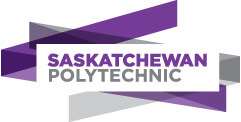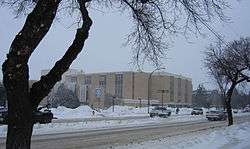Saskatchewan Polytechnic
Saskatchewan Polytechnic (formerly the Saskatchewan Institute of Applied Science and Technology or SIAST) is Saskatchewan's primary public institution for post-secondary technical education and skills training, recognized nationally and internationally for its expertise and innovation. Through program and course registrations, Saskatchewan Polytechnic serves 26,000 distinct students with programs that touch every sector of the economy. It operates campuses in Moose Jaw, Prince Albert, Regina and Saskatoon; and provides a number of courses and programs through distance education.
| Motto | Tomorrow in the making |
|---|---|
| Type | Polytechnic institution |
| Established | Saskatchewan Technical Institute (1959); Central Saskatchewan Technical Institute (1963); Saskatchewan Institute of Applied Arts and Sciences (1972); Northern Institute of Technology (1986); Saskatchewan Institute of Applied Arts, Sciences and Technology (SIAST) (1988); Saskatchewan Polytechnic (2014) |
| President | Dr. Larry S. Rosia |
Administrative staff | 1,643 |
| Students | 14,176 full load equivalent (2018) Saskatoon campus: 7,956; Regina campus: 4,444; Moose Jaw campus: 3,192; Prince Albert campus: 2,883 [1] |
| Location | , , Canada S7K 3R5 |
| Campus | Saskatoon Moose Jaw Regina Prince Albert |
| Colours | Purple , Grey |
| Affiliations | CCAA, ACCC, AUCC, CIS, CWUAA, CBIE, CUP. |
| Website | www |
 | |
Programs
Saskatchewan Polytechnic offers over 150 programs in applied/visual media, aviation, basic education, business, community/human services, engineering technology, health services, hospitality/food services, industrial/trades, natural resources, nursing, technology, recreation and tourism, and science. In addition, SIAST provides training to apprentices in several trades.
Campus

Saskatchewan Polytechnic comprises four campuses in Saskatchewan:
- Saskatoon (formerly SIAST Kelsey Campus)
- Located at Idylwyld and 33rd Street in Saskatoon, the campus is named for Henry Kelsey a famous fur trader and explorer. The institute in Saskatoon dates back to 1941 when The Canadian Vocational Training School was established to train veterans returning from the war.[2] The campus contains over 13 acres (5.3 ha) of instructional floor space.[2]
- Moose Jaw (formerly SIAST Palliser Campus)
- Regina (formerly SIAST Wascana Campus)
- Prince Albert (formerly SIAST Woodland Campus)
History
The four schools that make up Saskatchewan Polytechnic started off as four individual schools. The Moose Jaw campus started off as the Saskatchewan Technical Institute in 1959. Saskatoon began as the Central Saskatchewan Technical Institute in 1963. Regina began as the Saskatchewan Institute of Applied Arts and Sciences in 1972. Prince Albert began as the Northern Institute of Technology in 1986. In January 1988, The Institute Act and the Regional Colleges Act amalgamated Saskatchewan's technical institutes, urban community colleges and the Advanced Technology Training Centre to form the Saskatchewan Institute of Applied Science and Technology (SIAST). The institution was named Saskatchewan Polytechnic on September 24, 2014.[3]
Athletics
Until 2018, all four campuses had athletic teams that competed in the Prairie Athletic Conference. The teams were also members of the Canadian Collegiate Athletic Association until 1994. The teams competed in basketball, volleyball, indoor soceer/futsal, ice hockey, badminton, and curling.
- CCAA National Championships
- Women's Curling: Moose Jaw Panthers (2) (1984, 1987)
- Women's Doubles Badminton: Saskatoon Amaruks (1) (1982)
- Women's Singles Badminton: Regina Wildcats (1) (1982)
- PAC Provincial Championships
Saskatoon Amaruks:
Extended content |
|---|
|
Moose Jaw Panthers:
Extended content |
|---|
|
Regina Wildcats:
Extended content |
|---|
|
Partnerships
Saskatchewan Polytechnic maintains reciprocal arrangements with partner institutions, including:
Scholarships
Saskatchewan Polytechnic joined Project Hero, a scholarship program cofounded by General (Ret'd) Rick Hillier, for the families of fallen Canadian Forces members.[4]
References
- "Saskatchewan Polytechnic quick facts". Saskatchewan Polytechnic. Retrieved April 11, 2019.
- "SIAST Kelsey Campus (Saskatoon)". Saskatchewan Institute of Applied Science and Technology. Archived from the original on July 11, 2011.
- "SIAST re-launches as Saskatchewan Polytechnic". CBC News. Retrieved 2014-09-24.
- "Archived copy". Archived from the original on 2010-01-13. Retrieved 2011-02-20.CS1 maint: archived copy as title (link) Project Hero